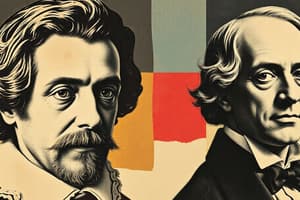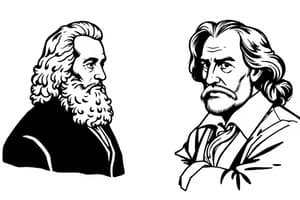Podcast
Questions and Answers
What did Thomas Hobbes compare the government to in his book 'Leviathan'?
What did Thomas Hobbes compare the government to in his book 'Leviathan'?
- A mythological sea monster (correct)
- A social contract
- A group of philosophers
- A protective shield
According to Hobbes, what led to the creation of a sovereign power?
According to Hobbes, what led to the creation of a sovereign power?
- The influence of Enlightenment philosophers
- The need for a monarch to rule the kingdom
- The fear of violent death in the state of nature (correct)
- The desire for personal freedom and equality
What did Hobbes believe the social contract involved?
What did Hobbes believe the social contract involved?
- The recognition of natural equality among individuals
- The establishment of democratic processes
- The relinquishing of natural rights for security (correct)
- An agreement between the monarch and the people
Why did Hobbes argue that a king was the best form of government?
Why did Hobbes argue that a king was the best form of government?
What was the outcome of the civil war in England in 1649?
What was the outcome of the civil war in England in 1649?
What does Hobbes suggest is the nature of individuals in a 'state of nature'?
What does Hobbes suggest is the nature of individuals in a 'state of nature'?
What happens to the people's rights after they agree to the social contract, according to Hobbes?
What happens to the people's rights after they agree to the social contract, according to Hobbes?
What was Thomas Hobbes' view on political authority?
What was Thomas Hobbes' view on political authority?
What was Hobbes's primary concern regarding the church's involvement in government?
What was Hobbes's primary concern regarding the church's involvement in government?
Which thinker argued that natural rights are inalienable?
Which thinker argued that natural rights are inalienable?
What role did Locke believe the government primarily served?
What role did Locke believe the government primarily served?
What was Montesquieu's view on the nature of individuals in a state of society?
What was Montesquieu's view on the nature of individuals in a state of society?
Which system of government did Montesquieu favor?
Which system of government did Montesquieu favor?
How did Hobbes believe individuals should respond to conflicts between divine law and royal law?
How did Hobbes believe individuals should respond to conflicts between divine law and royal law?
What did Locke argue regarding the social contract?
What did Locke argue regarding the social contract?
What did Locke believe about voting rights?
What did Locke believe about voting rights?
What was the main purpose of government according to Montesquieu?
What was the main purpose of government according to Montesquieu?
According to Hobbes, absolute kings were viewed as?
According to Hobbes, absolute kings were viewed as?
What was a major flaw in Montesquieu's interpretation of the English government?
What was a major flaw in Montesquieu's interpretation of the English government?
Which natural rights did Locke prioritize the most?
Which natural rights did Locke prioritize the most?
What did Montesquieu argue about the concentration of governmental power?
What did Montesquieu argue about the concentration of governmental power?
What was the significant outcome of the Glorious Revolution that Locke supported?
What was the significant outcome of the Glorious Revolution that Locke supported?
What did Rousseau believe was the source of social inequalities?
What did Rousseau believe was the source of social inequalities?
How did Rousseau view the concept of the social contract compared to other philosophers like Hobbes and Locke?
How did Rousseau view the concept of the social contract compared to other philosophers like Hobbes and Locke?
What was Rousseau's stance on how laws should be made in a democracy?
What was Rousseau's stance on how laws should be made in a democracy?
In Rousseau's view, what must citizens do to experience true freedom in a state?
In Rousseau's view, what must citizens do to experience true freedom in a state?
What did Rousseau mean by the term 'general will'?
What did Rousseau mean by the term 'general will'?
What warning did Rousseau provide regarding the disengagement of citizens from state affairs?
What warning did Rousseau provide regarding the disengagement of citizens from state affairs?
Which of the following did Rousseau believe regarding the role of religion and its relation to the state?
Which of the following did Rousseau believe regarding the role of religion and its relation to the state?
What did Rousseau suggest about the officials of the government in his ideal democracy?
What did Rousseau suggest about the officials of the government in his ideal democracy?
How did Rousseau view the relationship between individual freedom and societal laws?
How did Rousseau view the relationship between individual freedom and societal laws?
What concept did Rousseau introduce to indicate the collective will of the people in governance?
What concept did Rousseau introduce to indicate the collective will of the people in governance?
In what way did Rousseau's vision of democracy differ from that of Montesquieu?
In what way did Rousseau's vision of democracy differ from that of Montesquieu?
What did Rousseau believe about natural rights in relation to government authority?
What did Rousseau believe about natural rights in relation to government authority?
What did Rousseau propose to replace the traditional monarchy?
What did Rousseau propose to replace the traditional monarchy?
Flashcards
State of Nature
State of Nature
A condition where individuals are naturally equal and free, leading to a constant fear of violence and a life lacking in order and security.
Social Contract (Hobbes)
Social Contract (Hobbes)
An agreement among individuals to give up some freedoms for a sovereign power to maintain peace and order.
Leviathan (Hobbes)
Leviathan (Hobbes)
A powerful state with absolute authority needed to impose law and order.
Absolute Power (Hobbes)
Absolute Power (Hobbes)
Signup and view all the flashcards
Thomas Hobbes
Thomas Hobbes
Signup and view all the flashcards
Natural Rights (Hobbes)
Natural Rights (Hobbes)
Signup and view all the flashcards
Sovereign (Hobbes)
Sovereign (Hobbes)
Signup and view all the flashcards
State of Nature (Implications)
State of Nature (Implications)
Signup and view all the flashcards
Rousseau's View on Human Nature
Rousseau's View on Human Nature
Signup and view all the flashcards
State of Nature (Rousseau)
State of Nature (Rousseau)
Signup and view all the flashcards
Social Contract (Rousseau)
Social Contract (Rousseau)
Signup and view all the flashcards
Social Contract (Purpose)
Social Contract (Purpose)
Signup and view all the flashcards
General Will
General Will
Signup and view all the flashcards
Direct Democracy
Direct Democracy
Signup and view all the flashcards
Civil State (in Rousseau's view)
Civil State (in Rousseau's view)
Signup and view all the flashcards
Separation of Powers (Rousseau's View)
Separation of Powers (Rousseau's View)
Signup and view all the flashcards
Rousseau's Concept of 'forced freedom'
Rousseau's Concept of 'forced freedom'
Signup and view all the flashcards
Civil Religion
Civil Religion
Signup and view all the flashcards
Rousseau's ideal Democracy
Rousseau's ideal Democracy
Signup and view all the flashcards
Rousseau's view of Property
Rousseau's view of Property
Signup and view all the flashcards
Rousseau vs. other philosophers.
Rousseau vs. other philosophers.
Signup and view all the flashcards
Rousseau's influence on the U.S. Constitution
Rousseau's influence on the U.S. Constitution
Signup and view all the flashcards
Hobbes's view on Church and King
Hobbes's view on Church and King
Signup and view all the flashcards
Enlightenment thinkers' focus
Enlightenment thinkers' focus
Signup and view all the flashcards
Enlightenment values
Enlightenment values
Signup and view all the flashcards
Locke's natural rights
Locke's natural rights
Signup and view all the flashcards
Locke's view of social contract
Locke's view of social contract
Signup and view all the flashcards
Locke's limited government
Locke's limited government
Signup and view all the flashcards
Locke's right to revolt
Locke's right to revolt
Signup and view all the flashcards
Montesquieu's view of the state of nature
Montesquieu's view of the state of nature
Signup and view all the flashcards
Montesquieu's purpose of government
Montesquieu's purpose of government
Signup and view all the flashcards
Montesquieu's preferred government model
Montesquieu's preferred government model
Signup and view all the flashcards
Montesquieu's separation of powers
Montesquieu's separation of powers
Signup and view all the flashcards
Locke's view on property rights
Locke's view on property rights
Signup and view all the flashcards
Locke's preference for representatives
Locke's preference for representatives
Signup and view all the flashcards
Hobbes concern on religion
Hobbes concern on religion
Signup and view all the flashcards
Study Notes
Hobbes's Philosophy on Government
- Hobbes argued for absolute monarchy, likening government to a leviathan (mythological sea monster).
- He described a "state of nature" where life was "solitary, poor, nasty, brutish, and short" due to the absence of laws and order.
- Hobbes believed individuals needed a supreme power (sovereign) to impose peace and secure life, liberty, and property.
- The social contract, an agreement among the people, gave absolute power to the sovereign (king).
- Hobbes believed the sovereign should not be challenged and saw the church as a governmental department, under the king's control.
Locke's Philosophy on Government
- Locke argued that natural rights (life, liberty, and property) existed in the state of nature and were inalienable (cannot be surrendered).
- Locke disagreed with Hobbes about the social contract, believing it was an agreement between the people and the sovereign (ideally a king).
- According to Locke, the king's power was limited by natural rights; he acted to protect them.
- Locke advocated for a representative government, like the English Parliament, with representation limited to property owners.
- He believed in "light governance," focused on protecting property and promoting commerce.
Montesquieu's Philosophy on Government
- Montesquieu viewed humans in a state of nature as avoiding violence and seeking society due to a need for food.
- He believed that the purpose of government was to maintain law, order, liberty, and property.
- Montesquieu favored the English system, with its separation and balancing of powers among the legislative, executive, and judicial branches.
- He argued for separation of powers to prevent any branch from becoming too powerful, as seen in the English Parliament, the courts, and the monarchy. This concept was applied in the U.S. Constitution.
Rousseau's Philosophy on Government
- Rousseau believed humans were naturally good, corrupted by society.
- He described a state of nature where individuals were free, equal, and peaceful.
- Rousseau saw the social contract as a fraud, where the wealthy tricked the masses into accepting rulers.
- He advocated for a democracy based on the "general will" dictated by direct citizen participation.
- Rousseau favored a direct democracy where every citizen voted on laws to express the general will.
- He thought that anyone that disobeyed the general will of the people should be forced to obey (forced to be free).
Key Enlightenment Thinkers and Concepts
- The Enlightenment saw European philosophers debating the best forms of government.
- Hobbes supported absolute monarchy, while Locke favored a limited government protecting natural rights.
- Montesquieu advocated for the separation of powers and a balanced government.
- Rousseau championed a direct democracy based on the general will of the people.
Debate Topics (from the Activity)
- Representative democracy vs. other forms of government
- Power to declare war
- Direct democracy vs. representative democracy
- Role of religion
- Government's ability to confiscate property for the public good
Studying That Suits You
Use AI to generate personalized quizzes and flashcards to suit your learning preferences.
Description
Explore the contrasting philosophies of Thomas Hobbes and John Locke regarding government and the social contract. Learn about Hobbes's advocacy for absolute monarchy and the perception of the state of nature as chaotic, compared to Locke's emphasis on natural rights and limited government. This quiz delves into their fundamental beliefs and contributions to political theory.




